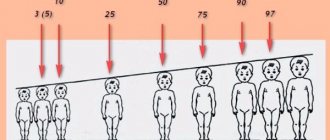Normal birth weight
Weight standards are average numbers. Its values are influenced by several factors. The first of these is gender. We will provide tables developed by the World Health Organization. These tables indicate the values in numbers and the rating: very low, low, below average, average, above average, high, very high.
We want values ranging from below average to above average. Everything other than this is a deviation that requires an analysis of the situation with a doctor.
Please note that the indicators are only suitable for full-term newborns. Premature babies have their own system for assessing physical development.
Boys' weight standards
| Indicator evaluation | Very low | Short | Below the average | Average | Above average | High | Very tall |
| Body weight, kilograms | 2.1 | 2.5 | 2.9 | 3.3 | 3.9 | 4.4 | 5.0 |
Thus, for boys, a body weight of 2.9 to 3.9 kg is considered normal. Below 2.9 kg is a deficiency (hypotrophy), above 3.9 kg is an excess, that is, paratrophy.
WHO table for boys
Weight standards for girls
| Indicator evaluation | Very low | Short | Below the average | Average | Above average | High | Very tall |
| Body weight, kilograms | 2.0 | 2.4 | 2.8 | 3.2 | 3.7 | 4.2 | 4.8 |
WHO table for girls
We see that the normal weight of female newborns is 2.8 – 3.7 kg.
How much should a baby weigh at 6 months?
There is an opinion that at six months a baby should be twice as heavy as it was at birth. And when the baby reaches one year, his weight should increase three times. This statement holds true because, based on WHO indicators, the normal weight of a child at 6 months should correspond to the following figures:
- for boys – 7.1 – 9.9 kg;
- for girls – 6.5 – 9.4 kg.
These are the limits. The first number displays the lower limits of the norm, and the second – its highest value. If we take into account that the average birth weight for babies is about 3.5-4.0 kg, then the WHO parameters for weight at six months of age correspond to the popular formula indicated above.
Weight loss in the first days
On the first day in the maternity hospital, the child loses his grams. This happens for several reasons:
- The intestines are cleared of meconium, the original feces, within three to four days. Meconium accumulates in the intestines during pregnancy;
- During the first few days, the mother produces colostrum. Its quantity is small, but due to its concentrated composition, colostrum completely satisfies the nutrient needs of the newborn, but there is little water in it;
- Physiological loss of fluid through the skin. In the womb, the baby is surrounded by amniotic fluid and its tissues contain a lot of moisture. After birth, excess moisture is lost from the skin, pores and lungs.
- Tissue swelling that occurs during childbirth goes away.
The baby may lose 10% of its original body weight within 4 to 5 days. This doesn't mean he's losing weight. On the contrary, everything unnecessary goes away: meconium, swelling, excess fluid. Premature babies lose more weight than full-term babies: up to 15% or more. If your newborn baby loses more than this figure, the neonatologist will definitely pay attention to this and take the necessary measures to identify the cause and eliminate it.
Loss of excess moisture is not dangerous for the body. On the 3rd – 4th day in multiparous women, and in primiparous women a little later, milk appears. Mother's milk contains enough liquid, so there is no need to supplement the baby's milk. The main thing is to feed him on demand so that he gets enough nutrition according to his needs.
Pay attention to the color of the skin and their color, the number of urinations and their volume (how many times you change diapers). If all these parameters correspond to the norm, then there is no reason to worry.
Newborn weight by month
Gain on the scale is one of the indicators of the health of a baby, be it a boy or a girl. Therefore, it is so important to know how much a child should gain. The pictures below show the average weight of a newborn by month. This data will help you monitor your baby's weight and understand whether he is gaining normally, too much or too little. Pediatrician Polina Aleksandrovna Kizino talks about the peculiarities of weight gain and loss in young children.
Weight in the first days of life
— Polina Aleksandrovna, what weight can be considered normal for a newborn at birth?
— The average weight of a newborn is about 3 kg, but it can be more or less. All babies have a different constitution, children are born at different stages. Even in the last two weeks of pregnancy, babies can actively gain weight, and depending on this, their birth weight parameters will differ. The weight of a newborn is a floating indicator that cannot be influenced, so you should not attach much importance to it.
— Why do newly born babies lose weight?
- Every newborn loses grams in the first three to four days. In the womb, the fetus is in an aquatic environment; evaporation does not occur from the surface of the body; it extracts oxygen from the mother’s blood. After birth, thermoregulation turns on, evaporation occurs from the surface of the skin and the baby begins to breathe. The inhaled air warms up, and liquid is also lost with breathing. In addition, during the first days of adaptation, the newborn receives little nutrition. These factors affect his weight.
Weight loss by a baby in the first day after birth is called physiological loss of body weight.
Table of newborn weight gain by month
— Are there periods when healthy children stop gaining weight? What are the reasons for weight fluctuations?
— Weighings are carried out monthly. In the first three months, changes on the scales are more noticeable; in subsequent months, the increases become smaller and smaller. This is a normal trend, so there is no need to expect that within six months the baby will gain the same weight as at four to eight weeks.
In addition, on different days, under the influence of many factors, the child may gain more or less actively. For example, in the first months, most children are breastfed, but mothers are still establishing lactation. During periods of increased activity and crawling, energy consumption increases sharply, so weight gain also slows down.
If there is no uniform, stable weight gain, there is no need to worry. The most important thing is that the child feels good. Excessive weight loss is a reason for an immediate visit to the pediatrician.
— Healthy weight varies. But, nevertheless, weight gain in newborns follows a similar pattern. How does a newborn's weight gain by month?
— After giving birth, the child does not immediately gain weight - he first loses weight, then catches it up to the levels at birth, and only then begins to gain weight. Then the weight grows most rapidly. From the fourth month, as the baby grows and becomes more active, the weight gain will be less than in one to three months.
Newborn weight by month
| Table 1. Norms of weight gain up to one year - Union of Pediatricians of Russia | Table 2. Norms of weight gain up to one year - WHO |
— Does the type of feeding affect body weight?
— With artificial feeding, the mother knows how much formula the child receives. And if he gains weight within normal limits, then the current amount of nutrition is maintained.
Natural feeding is a little more complicated. The mother cannot always know how much milk the baby will suck.
- Malnutrition.
Sometimes it seems that the child is eating a lot, but when weighed, the increase turns out to be low. This may be due to a lactation crisis, when there is less milk in the breast than the baby needs. Therefore, weight gain slows down. But this does not indicate the need to switch to breast milk substitutes. Rather, this is a signal for the mother to pay attention to the situation and take measures to improve lactation. - Overfeeding.
Cases of breastfeeding are rare. There are children who gain a lot on mother's milk, but the likelihood of overeating is low, since the volume of the stomach does not increase several times during one feeding. The baby is more likely to spit up excess milk that is eaten.
— How does a genetic factor affect the weight of a newborn?
— Heredity affects the rate of weight gain. For example, if in a family the mother and father are light in weight and gained little in the first year, then their child may also show this tendency. A petite mother may have a small baby at birth. And even if he gains weight according to schedule, his indicators will be closer to the lower limit of the age norm.
— What should parents pay attention to first?
— Normally, a child should not lose weight, but, nevertheless, the weight indicator is not constant. A baby can gain well within three weeks, but in the fourth week he gets sick - his appetite will decrease and his weight will increase. As a result, the monthly increase will be less than normal.
By the way, weighing is not enough to assess physical development: height is also measured. If there are changes in growth, then weight loss is not critical, since if there was insufficient nutrition, the child would not grow.
Mental state is also important. If a child is malnourished, hungry and exhausted, then his development is slower than with adequate nutrition.
Height, weight and mental development indicators need to be assessed together to get a clearer picture and understand whether the child is eating enough.
Excess weight or deficiency: what should parents do?
— Polina Aleksandrovna, what to do if the child is gaining weight incorrectly?
— You should consult a pediatrician and evaluate the baby’s development indicators. Slow growth on the scale can be an individual feature. Most often, the baby does not gain weight on the breast due to lack of milk. If weight gain occurs slowly and at the same time height increases just as slowly, there is a delay in psychomotor development, the baby is lethargic and without strength, then the doctor will prescribe supplementary feeding with a nutritional formula or give recommendations for improving lactation.
The problem of underweight in infants on artificial nutrition is solved by increasing the amount of formula in order to increase the amount of nutrients in the diet.
— What if the child loses weight?
— If a child loses weight, you should immediately consult a doctor. For an infant under one year old, weight loss is not a good sign. A child may gain weight a little faster or a little slower, but he should always gain weight. With different rates of increase, it is important to assess what happened to the child, what circumstances led to weight instability (cold, fever, poor appetite) or why he lacks nutrition.
Once your baby has regained adequate weight gain, you can wean off formula and return to full breastfeeding.
— So it’s easier and faster to increase a baby’s weight gain using formula?
— The only way to correct weight gain (in the case when the child is healthy and does not have diseases leading to impaired absorption of food) is to adjust the diet. It turns out to be possible to do this only through breast milk - good. If it doesn’t work, supplementary feeding with milk formula is introduced. As additional nutrition, you can buy goat milk formulas, for example, MAMAKO® Premium. Goat's milk is comfortable for digestion; this food is adapted for proteins and contains complexes that make the mixture as similar in composition as mother's milk, thereby allowing the child to receive all the necessary nutrients.
— How can you tell if a child is gaining weight too quickly and is at risk of obesity?
— In the first year of life they don’t talk about obesity. When breastfeeding, it is not customary to limit the baby's ability to attach to the breast - he suckles as much as he needs, so it is difficult to track the daily volume of breast milk consumed. The volume of formula for artificial infants can be controlled and slightly varied downwards with active weight gain. But, as a rule, even if a child gains very actively in the first six months, when he begins to crawl and move, the weight stabilizes.
In addition, weight may be gained due to increased height. Therefore, you need to focus not only on weight data, but also on weight indicators relative to height and age, and initial birth weight. A baby may gain little in one month, and then gain more, compensating for insufficient weight gain in the previous period.
Nutrition culture is instilled from the first year. In order not to provoke obesity, it is not recommended to give your baby excess carbohydrates in the form of sugar. You should try to structure your diet wisely and include not only carbohydrate foods (porridge, formula, breast milk), but also vegetable and fruit purees, which contain fiber and help fruit sugar to be absorbed more evenly.
— How should you change your child’s diet if he is gaining weight too quickly?
— You cannot reduce the amount of food, because the child will be hungry and restless. When formula-fed, it is sometimes possible to adjust the volume of the formula, but only if this does not lead to anxiety.
From four months onwards, nutrition can be adjusted through complementary feeding. For a child with active, close to increased rates of weight gain, complementary feeding can be started with vegetables. Porridges will be administered less intensively. The child also needs to be introduced to them, but the emphasis should be on vegetable and meat products that contain more fiber and proteins.
— Weight problems in young children may not be obvious, because often plump or sleeping babies only make parents happy. How not to miss a child’s health problem?
— Up to one year old, babies undergo pediatric examinations monthly. The pediatrician himself will pay attention to unfavorable signs.
- Rapid weight gain often does not require urgent medical intervention.
- Slow weight gain is especially typical for infants in the first or second month of breastfeeding during the period of establishing lactation.
- If there is a lack of breast milk, the baby is very lethargic, tends to sleep almost all the time and shows no interest in what is happening around him.
Weight standards vary from person to person. Weight indicators are influenced by body composition, initial birth weight, and type of feeding. At the same time, in order to assess how adequate the weight gain is, you also need to take into account height gains, psychomotor development and the general well-being of the baby. Violation of the condition will be a reason to come for a control weigh-in not in a month, but earlier.
Pediatrician Polina Aleksandrovna Kizino
*The ideal food for an infant is mother's milk. WHO recommends exclusive breastfeeding for the first 6 months. MAMAKO® supports this recommendation. Before introducing new foods into your baby’s diet, consult a specialist.
Formula for calculating the weight of a newborn
The Quetelet index can be applied to people of any age, not just newborns. But kids have their own analysis system. To calculate, we need to know the baby's height in centimeters and his body weight in grams.
For example, a newborn’s weight is 3300 g and height is 51 cm. 3300: 51 = 65
The Quetelet index turned out to be 65. The average values are 60 – 70. This means that everything is in order with our theoretical patient. If the number is higher or lower than these limits, consult your pediatrician. Please note that the formula only applies to babies born on time.
How many grams per month should a child gain?
The formula takes into account the average monthly weight gain - 800 g. For an accurate calculation:
- from 1 month to 6 months: add 800 x number of months to the values at birth. For example, a girl was born with an ideal weight of 3,200 g. By 1 month she will weigh approximately 4,000 g, and by two - 4,800 g (3,200 + 800 x 2 = 4,800);
- from 6 months: birth weight + 800 x 6 + 400 x (number of months - 6), where we first calculate the indicators at 6 months of age, and sum it up with body weight after six months. This means that by 8 months our baby will weigh 8,800 g.
You can also use the WHO tablets for boys and girls: they have values from birth to 13 weeks.
Reasons for baby gaining weight too quickly
Oddly enough, too much weight gain is also not very good.
The reasons for this violation may be:
- Physiological feature of development.
- Higher growth rates compared to the norm.
- Artificial feeding (an artificial baby always gets better faster than breastfed babies).
- Excessive feeding - formula or breast milk. It is extremely difficult to overfeed a child with breast milk, but it is possible if feedings are on demand, quite frequent and long, and there is more hind milk (more high-calorie) in percentage terms than fore milk.
- Poor quality of the mixture.
It is important to understand that too rapid weight gain in a baby can indicate various diseases, including thyroid disease!
What affects body weight
Weight depends on many factors. Some of them contribute to excess weight, and some, on the contrary, contribute to deficiency. Let's list them:
- Gestational age, or gestational age. If the baby was born early or late, it is obvious that its indicators will differ from the accepted standards;
- The mother’s health status, the presence or absence of illnesses;
- Nature of nutrition and lifestyle;
- Taking medications;
- Constitution of both parents;
- The condition of the child himself both during pregnancy (intrauterine problems), and during childbirth and immediately after;
- Gender of the baby.
Check weighing
Control weighing is carried out when you need to find out whether the baby has enough breast milk. In the case of artificial feeding, there are no problems with controlling the amount of food taken.
The weighing rules are:
- We take measurements before and after one feeding;
- we try to use the same scales;
- We make sure that the baby wears the same clothes;
- If the baby gets his diaper dirty during feeding, there is no need to change or remove it;
- We take measurements several times in a row during the day or on different days to get a reliable result.
If the results show that there is not enough milk, then the mother needs to think about increasing lactation. Ask the pediatrician who is caring for your newborn to select a drug.
Up to 10 days, the calculation is carried out according to the formula: milk volume = 2% of body weight multiplied by the number of days of life. For example, our fictional baby weighing 3,200 on the fifth day of life should eat 320 ml of milk per day. We divide this figure by the number of feedings.
For older children, a different method is used. From 2 to 4 weeks, the required milk volume is 1/5 of body weight per day, from 6 weeks to 4 months - 1/6.
About non-compliance with weight standards
Sometimes at this age the baby does not gain weight. And, most likely, this is due to the woman’s insufficient milk supply. You can try to stimulate lactation using teas specially designed for this. Rosehip decoction and fennel infusions, which should be drunk 30 minutes before feeding, also help. When such measures do not increase lactation within a week, you need to supplement the baby with formula.
But more often this childhood age (more artificially) is characterized by excess weight. This means that the baby eats more than he needs. You should not allow him to eat more, or you should simply increase the intervals between feedings. Another option is to make the mixture more liquid than recommended in the instructions. And, of course, you need to cancel night feeding.
If the baby’s weight exceeds the norm by 15%, then we are talking about mild obesity. Perhaps the reason for this is a genetic predisposition to obesity in the family. You shouldn't hope that this will go away with age. Already now do more active exercises with your baby, perhaps twice a day. Don't overfeed him!
By this age, the baby has already learned a lot, he has grown and become stronger, has certain skills, actively explores the world, and develops all his senses. The development of a child at 6 months, whether a boy or a girl, is approximately the same. Although there is a tendency for boys to be ahead in height and weight, girls develop emotionally faster. Now there are many new achievements in the physical development of a child at 6 months:
- The baby can actively turn on its side and back, and it can also roll over in the opposite direction.
- The baby actively plays with his arms and legs; due to his flexibility, he can easily suck not only his fingers, but also his toes. He actively raises his head to his feet to grab them with his hands.
- A child can take a toy from the hands of adults, as well as from any surface, while holding it firmly in his hands, knocking or waving it, throwing it and picking it up again
- Can play with two rattles in two hands at the same time, hitting them against each other or on surfaces
- Arches the back, leaning on the legs and the back of the head like a “bridge”
- Tries to get on all fours, swinging to the sides and squatting on his butt, tries to crawl while lying on his stomach behind objects, or makes forward movements on all fours
- Learns to sit while leaning on hands
- Trying to pull himself up in bed
- He reaches out to the toys hanging in front of him and grabs them.
The mental development of children under 6 months also does not lag behind the physical development. Exploring the world, a child puts everything into his mouth, thus stimulating the receptors not only of taste, but also of touch, determining the density and shape of an object. Until the moment the baby speaks, he can pull everything into his mouth, thus developing. Now the child should be occupied with toys and objects that adults “play” with (phone, remote control, laptop). They reach out to them, touch them, try to play with them. In communication, babbling appears with different intonations; the baby distinguishes well the emotions of adults, positive and negative, and reacts to them. Also, at the request of relatives, the baby may look for familiar objects, distinguish between relatives and strangers, and may become frightened. The baby is already establishing connections between an action and its consequence, reacting to sounds - newer and familiar, and will study a new toy with interest.
Should I worry if I deviate from the norm?
Anthropometric data provide some information about the baby’s development. You compare your numbers with the average values of a healthy baby: it is desirable that they fall within the normal range. But there may also be deviations: excess or deficiency. Fortunately, not in all cases they speak of pathology.
Overweight
Since ancient times, plump cheeks and an abundance of folds have been considered a sign of good health. But medicine says the opposite: you should be wary if your little one’s body weight exceeds the average. The reasons may be the following:
- the expectant mother eats for two, and this is not the healthiest food;
- postmaturity;
- hereditary factor;
- diabetes mellitus in a pregnant woman;
- swelling in a baby.
The pregnant woman is observed by an obstetrician-gynecologist for the entire period and undergoes examinations and tests. After birth, neonatologists and pediatricians take over the baton: they diagnose the newborn and monitor its development.
If you follow all the doctor’s instructions, there are no diseases, and no abnormalities were found in the baby, but the values are higher than normal, which means there is no reason to worry. Lead an active lifestyle and teach your child such a regimen. Over time, his body weight should return to normal - monitor this with your doctor. After all, overweight and obesity are not so rare among children. In addition, a large mass puts a strain on the child’s joints; it will then be difficult for him to sit down, crawl, and then walk.
Weight deficiency
A deficiency can result from:
- nutritional deficiency during gestation;
- chronic illnesses in the mother;
- mother's bad habits;
- taking medications such as antimetabolites;
- abnormalities of the placenta;
- child's illness.
In these cases, they speak of intrauterine growth retardation: the fetus does not receive enough nutrients, so dystrophic changes develop. Depending on the cause, the doctor selects treatment.
The child is not gaining weight well – possible reasons:
- A mother's milk deficiency is insufficient lactation. How to increase lactation - all available methods
- Low fat content of mother's milk. This is my mother’s fault - you should diversify your diet and eat high-calorie foods. Diets during this period are unacceptable.
- Poor absorption of food in the baby’s body due to dysbiosis or other problems.
- Poor organization of feeding. For example, the mother feeds the baby incorrectly, she is distracted, the child is uncomfortable eating, etc.
- Frequent regurgitation. You can’t put the baby to bed right after “dinner” - first you should hold the child vertically for 10 minutes, like a “soldier,” holding him close to you. This is necessary for the absorption of milk and the release of excess air.
- Too strict feeding regime. It is certainly necessary to accustom your child to a routine. But not in the first days after discharge from the hospital. It's too early to leave your child without nighttime snacks. In addition, do not rush to tear your baby off the breast at the time of “lunch”: there are leisurely babies who suck very slowly and are full only after 40 minutes.
- The baby is sucking incorrectly. The mother should consult with the pediatrician to understand how to properly give the baby a nipple so that sucking is complete.
- Development of neurological diseases. Typically, poor feeding quality is affected by problems with coordination of the facial muscles, as well as underdevelopment of specific areas of the oral apparatus.
- Infectious, viral or other disease.
- Formula milk is not suitable for a formula-fed baby.
- Stress. At such a young age, even swimming or massage can become physical stress for the little one.
The weight of the newborn and the physique of the parents
Constitutional characteristics are inherited, as are hair color, eye color or character. But this does not mean that the baby will be a copy of mom or dad: perhaps he will inherit the features of a distant relative.
Of course, calculating the normal weight of a newborn baby is important. It further affects his health, especially if the cause of the deviation is any serious illness. But if these are simply constitutional features, the baby will quickly gain weight in the future or normalize it if there was paratrophy. The main thing for him now is the care and attention of his mother and father, adherence to a daily routine, adequate nutrition and walks.











